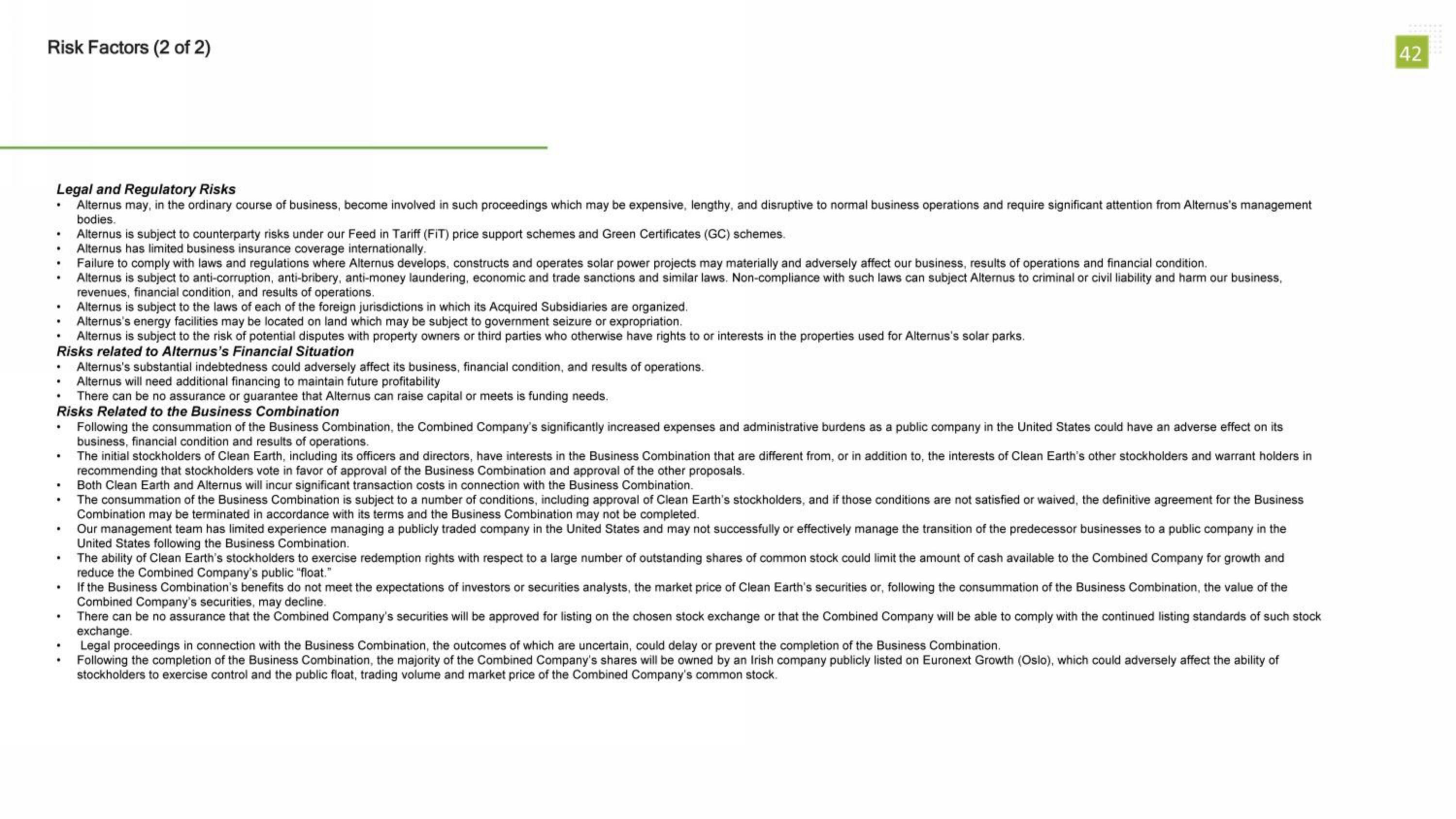Alternus Energy SPAC Presentation Deck
Risk Factors (2 of 2)
Legal and Regulatory Risks
Alternus may, in the ordinary course of business, become involved in such proceedings which may be expensive, lengthy, and disruptive to normal business operations and require significant attention from Alternus's management
bodies.
.
.
.
.
Failure to comply with laws and regulations where Alternus develops, constructs and operates solar power projects may materially and adversely affect our business, results of operations and financial condition.
Alternus is subject to anti-corruption, anti-bribery, anti-money laundering, economic and trade sanctions and similar laws. Non-compliance with such laws can subject Alternus to criminal or civil liability and harm our business,
revenues, financial condition, and results of operations.
Alternus is subject to the laws of each of the foreign jurisdictions in which its Acquired Subsidiaries are organized.
Alternus's energy facilities may be located on land which may be subject to government seizure or expropriation.
Alternus is subject to the risk of potential disputes with property owners or third parties who otherwise have rights to or interests in the properties used for Alternus's solar parks.
Risks related to Alternus's Financial Situation
Alternus's substantial indebtedness could adversely affect its business, financial condition, and results of operations.
Alternus will need additional financing to maintain future profitability
There can be no assurance or guarantee that Alternus can raise capital or meets is funding needs.
Risks Related to the Business Combination
.
●
.
.
Alternus is subject to counterparty risks under our Feed in Tariff (FiT) price support schemes and Green Certificates (GC) schemes.
Alternus has limited business insurance coverage internationally.
.
.
Following the consummation of the Business Combination, the Combined Company's significantly increased expenses and administrative burdens as a public company in the United States could have an adverse effect on its
business, financial condition and results of operations.
The initial stockholders of Clean Earth, including its officers and directors, have interests in the Business Combination that are different from, or in addition to, the interests of Clean Earth's other stockholders and warrant holders in
recommending that stockholders vote in favor of approval of the Business Combination and approval of the other proposals.
Both Clean Earth and Alternus will incur significant transaction costs in connection with the Business Combination.
The consummation of the Business Combination is subject to a number of conditions, including approval of Clean Earth's stockholders, and if those conditions are not satisfied or waived, the definitive agreement for the Business
Combination may be terminated in accordance with its terms and the Business Combination may not be completed.
Our management team has limited experience managing a publicly traded company in the United States and may not successfully or effectively manage the transition of the predecessor businesses to a public company in the
United States following the Business Combination.
The ability of Clean Earth's stockholders to exercise redemption rights with respect to a large number of outstanding shares of common stock could limit the amount of cash available to the Combined Company for growth and
reduce the Combined Company's public "float."
If the Business Combination's benefits do not meet the expectations of investors or securities analysts, the market price of Clean Earth's securities or, following the consummation of the Business Combination, the value of the
Combined Company's securities, may decline.
There can be no assurance that the Combined Company's securities will be approved for listing on the chosen stock exchange or that the Combined Company will be able to comply with the continued listing standards of such stock
exchange.
Legal proceedings in connection with the Business Combination, the outcomes of which are uncertain, could delay or prevent the completion of the Business Combination.
Following the completion of the Business Combination, the majority of the Combined Company's shares will be owned by an Irish company publicly listed on Euronext Growth (Oslo), which could adversely affect the ability of
stockholders to exercise control and the public float, trading volume and market price of the Combined Company's common stock.
42View entire presentation